Coffee Industry and News
illycaffè Continues Sponsorship of Biennale Arte 2024 with New Art Collection

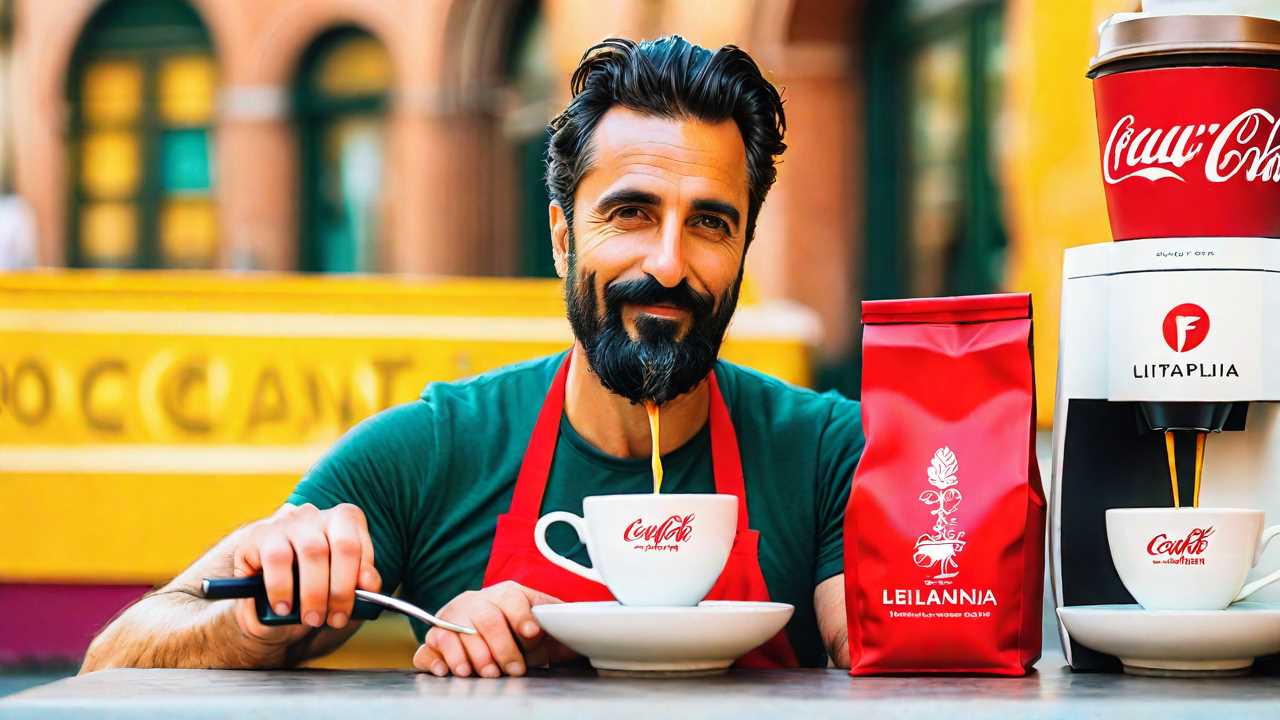
illycaffè Continues Sponsorship of Biennale Arte 2024 with New Art Collection
Supporting Beauty Through Art
Supporting Beauty Through Art
illycaffè, the renowned Italian coffee company, has announced its continued support as the main sponsor of the Biennale Arte 2024 “Stranieri Ovunque – Foreigners Everywhere” in Venice. This collaboration, which began in 2003, celebrates the exploration and promotion of beauty through contemporary art alongside one of the world’s most esteemed art events.
New illy Art Collection
This year, the partnership takes on a new dimension with the introduction of the illy Art Collection featuring works by emerging Latin American artists. These artists, carefully selected by the curator of Biennale Arte 2024, Adriano Pedrosa, have the opportunity to showcase their talent and gain increased visibility and artistic growth.
Creativity on Display
The iconic illy cups, known for their distinctive design, have once again been transformed into blank canvases for the chosen artists. This unique collaboration allows them to express their creativity and strengthens the fusion of beauty and excellence that characterizes the illy brand.
A Celebration of Dialogue and Inclusion
Cristina Scocchia, CEO of illycaffè, expresses delight in reaffirming the collaboration with the 60th International Art Exhibition. She states, “This year’s event celebrates those who are foreign or distant, using the language of contemporary art, which has always been a catalyst for dialogue and inclusion. These are values that illycaffè upholds throughout its entire supply chain, consistently placing individuals at the core of its operations.”
Sustainable Quality and Refreshment
The ethical and aesthetic essence of illycaffè is embodied in the sustainable quality of its coffee. Attendees, including artists, collectors, curators, and visitors at the 60th International Art Exhibition, will have the opportunity to enjoy the unique illy blend at the Biennale Arte’s refreshment points. Additionally, during the inauguration days, a gazebo will be situated at the entrance to the Giardini della Biennale venue, offering the chance to savor illy coffee.
In the vast and diverse world of coffee, coffee alternatives, and tea, Olivia has found her calling. As an author and a dedicated coffee and tea aficionado, her work for Cappuccino Oracle reflects her profound love and understanding of the intricate complexities found within these beverages. Olivia’s passion for the subject serves as both a catalyst for her creativity and a connection point with her audience.
Olivia’s appreciation for coffee, coffee alternatives, and tea blossomed at an early age. She discovered that these beverages invigorated her senses and stimulated her creative spirit. From the nuanced flavors of single-origin roasts to the captivating narratives intertwined with coffee, coffee alternatives, and tea trade and culture, Olivia found an unlimited source of inspiration in her daily cup.
Her love for these beverages and her talent for storytelling eventually converged at Cappuccino Oracle. As an author, Olivia’s mission is to illuminate the intricate tapestry that makes up the world of coffee, coffee alternatives, and tea. Her articles span a diverse range of topics, encompassing everything from the unique flavors of different brews to the sociocultural history intertwined with their cultivation and consumption.
Sustainable and Ethical Tea Sourcing
Coffee Farm Water Conservation
Optimize your coffee farm’s water conservation methods to enhance yields and combat climate change—discover the strategies that can make a real difference.
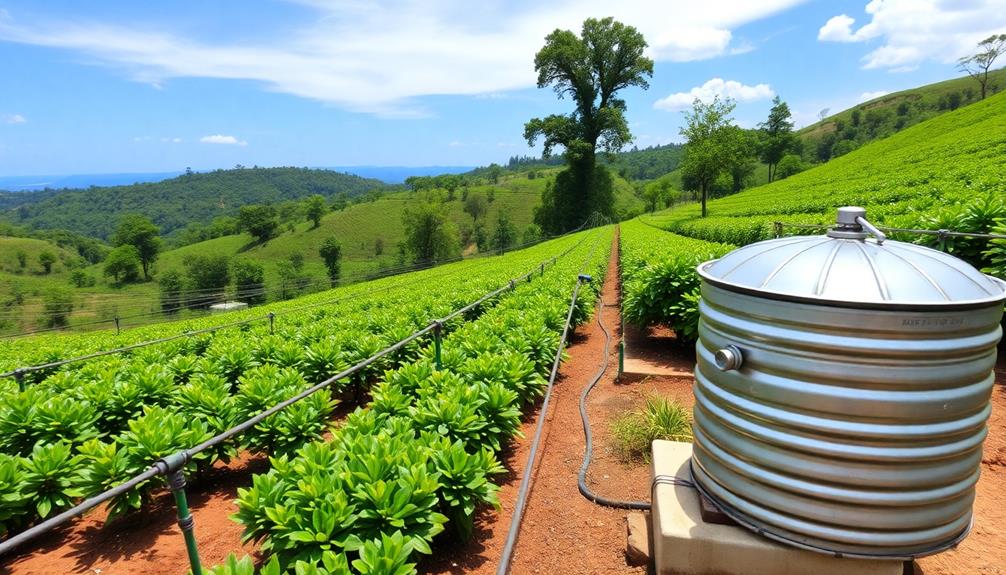
Coffee farm water conservation is essential due to the vast amount of water required—about 140 liters for a single cup. You can implement practices like rainwater harvesting to capture and use natural precipitation, which reduces reliance on groundwater. Shade-grown coffee not only conserves water but also enhances biodiversity by providing a natural canopy. Adopting efficient irrigation methods and monitoring soil moisture can optimize water usage, leading to better yields. By prioritizing these sustainable approaches, you'll not only save water but also fortify your farm against climate change. Discover more about effective strategies that can make a difference.
Key Takeaways
- Implement rainwater harvesting systems to collect and utilize rainwater for irrigation, reducing reliance on groundwater sources.
- Adopt shade-grown coffee practices that enhance biodiversity and minimize evaporation, conserving water during plant growth.
- Utilize water-efficient processing methods to significantly decrease water usage during coffee production and reduce wastewater contamination.
- Monitor hydric balance to optimize irrigation practices based on real-time soil moisture, ensuring efficient water use.
- Intercrop with native species to improve soil health and moisture retention, enhancing overall farm resilience against climate impacts.
Importance of Water Conservation
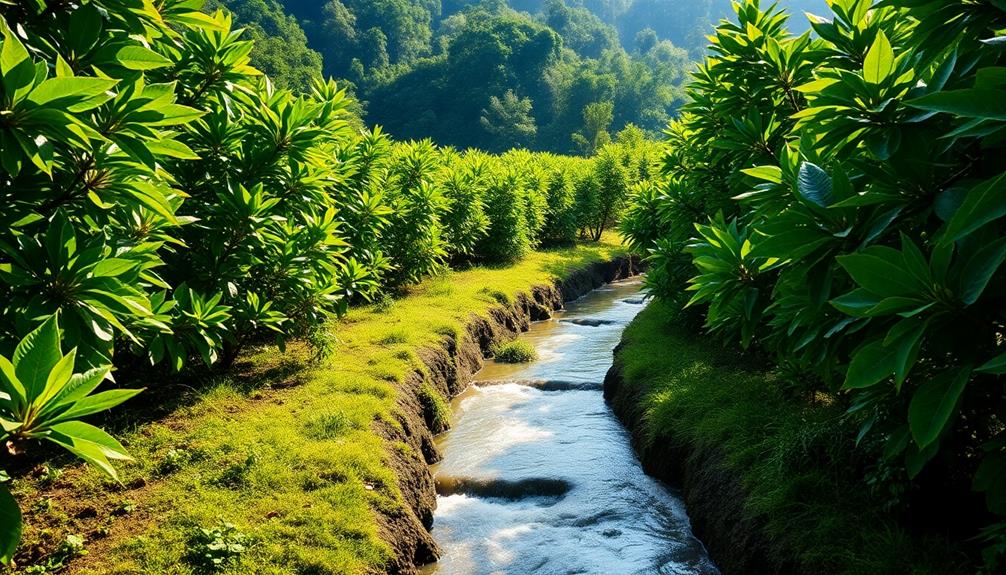
Water conservation is essential in the coffee industry, where producing just one 125 ml cup requires about 140 liters of water. As a coffee farmer, you face the challenge of managing precious water resources, especially in water-scarce regions. By prioritizing efficient water use, you can help combat the adverse effects of climate change while ensuring sustainability in your coffee production.
Implementing water-efficient processing methods is key. Techniques like rainwater harvesting systems can greatly reduce your water footprint, allowing you to maximize resources without compromising quality.
Additionally, embracing shade-grown coffee practices offers dual benefits; not only do they conserve water by minimizing evaporation, but they also support biodiversity. This creates healthier ecosystems that bolster crop resilience against pests and diseases.
Moreover, effective water management strategies can lead to cost savings for you as a farmer. By conserving water, you increase yields and enhance your farm's resilience to climate change impacts.
Ultimately, water conservation isn't just about saving resources; it's about securing a sustainable future for your coffee farms, ensuring that your coffee remains a beloved beverage for generations to come.
Water Footprint of Coffee
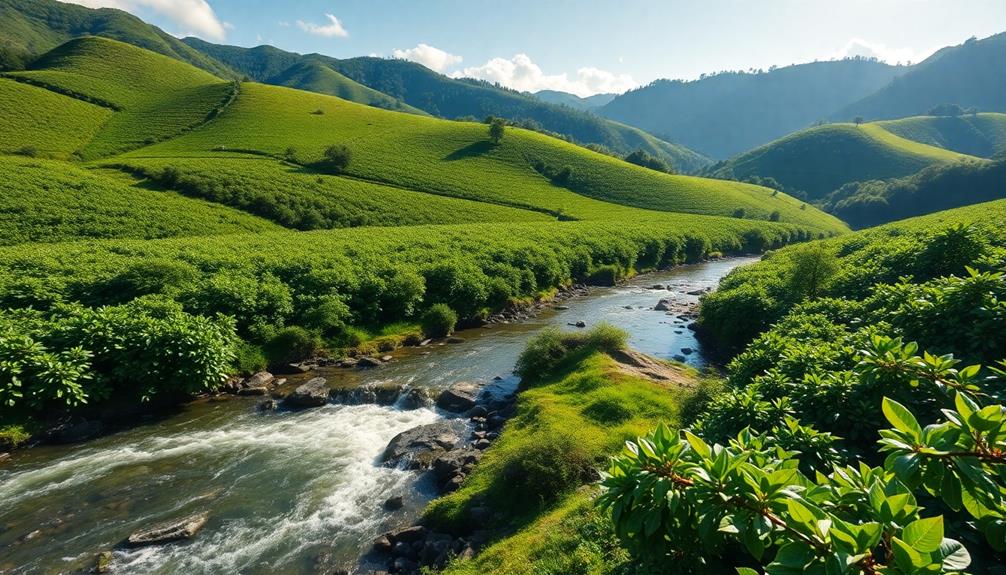
The coffee industry's water footprint is staggering, with the production of a single cup demanding about 140 liters of water. Much of this amount of water used occurs during the plant growth stage, making coffee cultivation particularly water-intensive. This intense demand greatly impacts water resources in Central and South America, areas already grappling with water scarcity.
But it doesn't stop there. The water footprint includes the water consumed in coffee processing facilities, where improper management can lead to contaminated wastewater, posing serious environmental risks. Factors like climate, geography, and farming methods play critical roles in determining overall water consumption.
By adopting specific conservation practices, you can help mitigate this impact. To effectively reduce water use in coffee farming, it's important to implement efficient irrigation techniques and robust wastewater treatment systems. These methods not only lower the overall water footprint but also promote sustainability in coffee production.
If you're passionate about your morning brew, consider the water conservation in coffee and support initiatives that focus on responsible farming practices. Together, we can make a difference in preserving our essential water resources while enjoying our favorite beverage.
Sustainable Practices in Coffee Farming
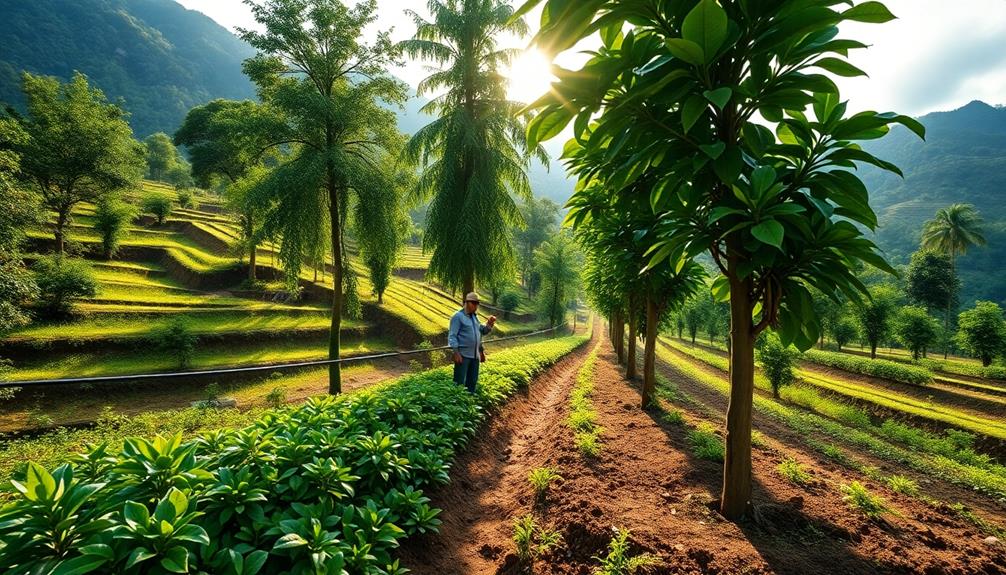
Effective coffee farming goes beyond just understanding the water footprint; it also involves adopting sustainable practices that conserve resources and protect the environment.
By integrating shade-grown coffee practices, you can utilize over 30% canopy cover, which not only reduces evaporation but also promotes soil moisture retention and enhances biodiversity within your coffee ecosystem.
Implementing rainwater harvesting systems allows you to collect and store rainwater for irrigation, cutting down your reliance on groundwater sources. This method enhances water conservation and guarantees your coffee plants receive adequate moisture during dry spells.
Additionally, using water-efficient processing methods, such as pulping machines designed for low water consumption, directly addresses the industry's water footprint, minimizing water usage during production.
Intercropping with native species can greatly improve soil health and moisture retention, while also supporting local biodiversity—crucial for maintaining pollinator populations essential for coffee production.
Finally, setting up wastewater treatment systems in your processing facilities will help mitigate environmental risks by reducing contaminated wastewater discharge into local ecosystems, securing a healthier environment for future generations.
Embracing these sustainable practices makes a real difference in coffee farming.
Benefits of Water Efficiency
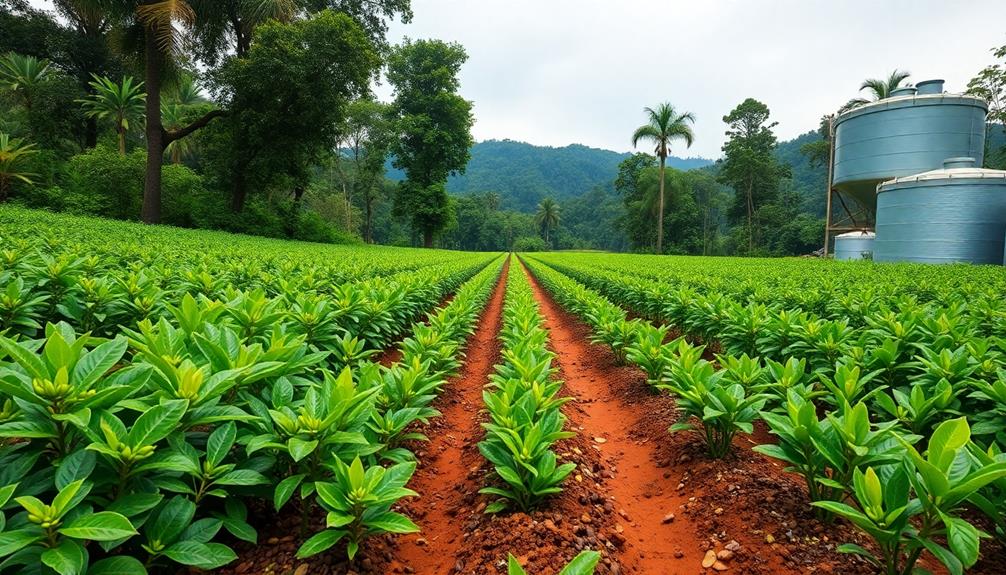
Embracing water efficiency in coffee farming brings numerous advantages that can transform your operations. By implementing practices like shade-grown coffee and rainwater harvesting, you can considerably reduce water usage while improving soil moisture retention. This means you won't need to rely as heavily on irrigation, which can lower costs and increase your crop's resilience.
Adopting water-efficient processing methods can also make a difference. Techniques like waterless coffee washing can conserve up to 150 gallons per wash, minimizing your overall water consumption.
Effective water management strategies, such as hydric balance monitoring systems, allow you to optimize irrigation based on real-time soil moisture levels, enhancing both crop health and productivity.
The financial benefits are clear: reduced water use translates to cost savings for you, promoting not just profitability but also environmental sustainability. By decreasing dependency on external water sources, you lower pollution from wastewater, contributing to overall water conservation in your area.
Moreover, by prioritizing water efficiency, you're better equipped to face the challenges posed by climate change, ensuring that your coffee farm remains viable and productive in the long run.
Challenges of Water Scarcity

Water scarcity presents a formidable challenge for coffee farmers, especially as they endeavor to implement water-efficient practices. The need for approximately 140 liters of water to produce just a single 125 ml cup of coffee places immense pressure on local water resources. In regions already grappling with water scarcity, this demand can exacerbate existing challenges, straining both communities and ecosystems.
Inefficient water management practices further complicate matters. When coffee farmers don't adopt sustainable approaches, they can inadvertently increase competition for limited water supplies among various agricultural sectors. This not only threatens the sustainability of coffee production but also impacts the overall environmental health of affected areas.
Moreover, climate change intensifies these water scarcity challenges. Unpredictable weather patterns can jeopardize both the quality and yield of coffee crops, making it essential for farmers to adapt their strategies.
To thrive in an increasingly water-scarce world, you must prioritize innovative methods to conserve water in coffee growing. Addressing these challenges head-on is essential for ensuring the future of coffee production and the well-being of local communities reliant on this critical resource.
Frequently Asked Questions
Is Coffee Farming Good for the Environment?
You'll find that coffee farming can benefit the environment when managed sustainably. It promotes biodiversity, enhances soil health, and reduces chemical use, all of which contribute to healthier ecosystems and long-term agricultural viability.
Is Coffee Growing Water Intensive?
Yes, coffee growing is water-intensive. You'll find it requires about 140 liters for just one cup. This high demand can strain local water resources, especially in regions already facing water scarcity and environmental challenges.
How Do You Farm Coffee Sustainably?
Did you know shade-grown coffee farms can reduce soil moisture evaporation by up to 30%? To farm coffee sustainably, you'll want to implement intercropping, use rainwater harvesting, and optimize irrigation with advanced technology for better yields.
What Are 3 Ways Coffee Farmers Can Protect Their Crops From Climate Change?
To protect your crops from climate change, you can implement shade-grown practices, utilize rainwater harvesting systems, and adopt intercropping techniques. These methods enhance resilience, conserve resources, and maintain soil health for sustainable farming.
Conclusion
In the world of coffee farming, conserving water isn't just smart; it's crucial. Remember, "A drop saved today is a drop saved tomorrow." By implementing sustainable practices, you're not only preserving a crucial resource but also enhancing your farm's productivity and resilience. Embracing water efficiency can lead to healthier crops and a more sustainable future for coffee farming. It's time to act—protecting our water means protecting the rich flavors we love in every cup.
In the vast and diverse world of coffee, coffee alternatives, and tea, Olivia has found her calling. As an author and a dedicated coffee and tea aficionado, her work for Cappuccino Oracle reflects her profound love and understanding of the intricate complexities found within these beverages. Olivia’s passion for the subject serves as both a catalyst for her creativity and a connection point with her audience.
Olivia’s appreciation for coffee, coffee alternatives, and tea blossomed at an early age. She discovered that these beverages invigorated her senses and stimulated her creative spirit. From the nuanced flavors of single-origin roasts to the captivating narratives intertwined with coffee, coffee alternatives, and tea trade and culture, Olivia found an unlimited source of inspiration in her daily cup.
Her love for these beverages and her talent for storytelling eventually converged at Cappuccino Oracle. As an author, Olivia’s mission is to illuminate the intricate tapestry that makes up the world of coffee, coffee alternatives, and tea. Her articles span a diverse range of topics, encompassing everything from the unique flavors of different brews to the sociocultural history intertwined with their cultivation and consumption.
Sustainable and Ethical Tea Sourcing
Bird-Friendly Coffee Certifications
How does choosing Bird-Friendly coffee support wildlife and farmers alike? Discover the surprising benefits behind this sustainable choice!
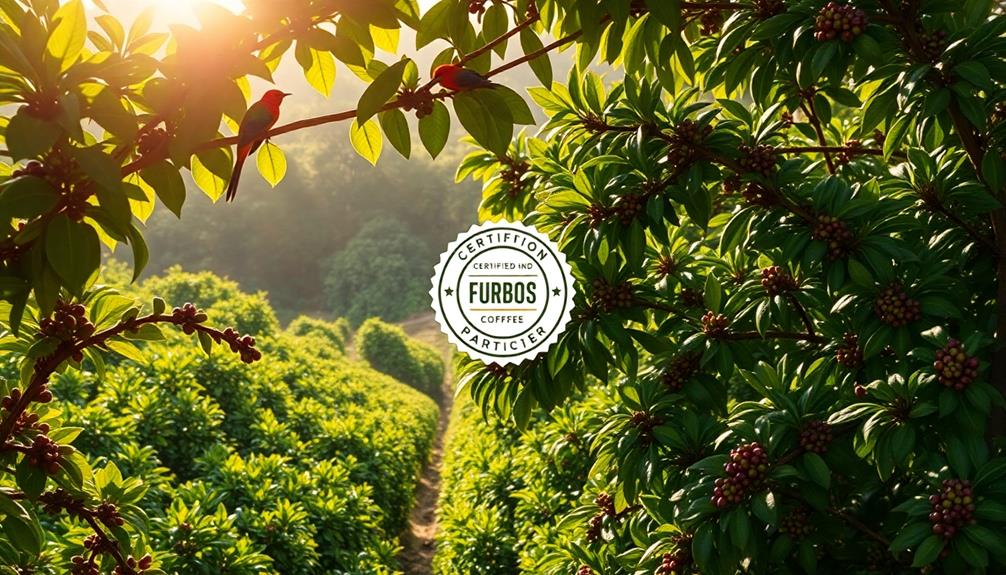
Bird-Friendly coffee certifications guarantee that the coffee you sip comes from farms that protect habitats for migratory birds. By promoting shade-grown practices, these certifications support biodiversity and combat climate change. When you choose Bird-Friendly coffee, you help maintain the ecological balance necessary for various species. Plus, it often leads to premium pricing for farmers, boosting their income stability. You'll find these sustainable options in local stores or online retailers dedicated to eco-friendly products. Enjoy a delicious cup while contributing to positive environmental change. Curious about how these practices benefit both wildlife and farmers? There's much more to discover!
Key Takeaways
- Bird Friendly® certification ensures coffee is grown sustainably, protecting habitats for migratory birds and promoting biodiversity.
- Certified farms follow strict environmental standards, maintaining shade coverage and diverse plant life essential for ecosystem health.
- The certification supports climate change mitigation by promoting agroforests that sequester carbon and reduce greenhouse gas emissions.
- Farmers benefit economically from premium pricing and access to niche markets that prioritize eco-friendly products.
- Bird Friendly certified coffee is available at local stores, cafés, and online retailers catering to environmentally conscious consumers.
Importance of Bird-Friendly Certifications
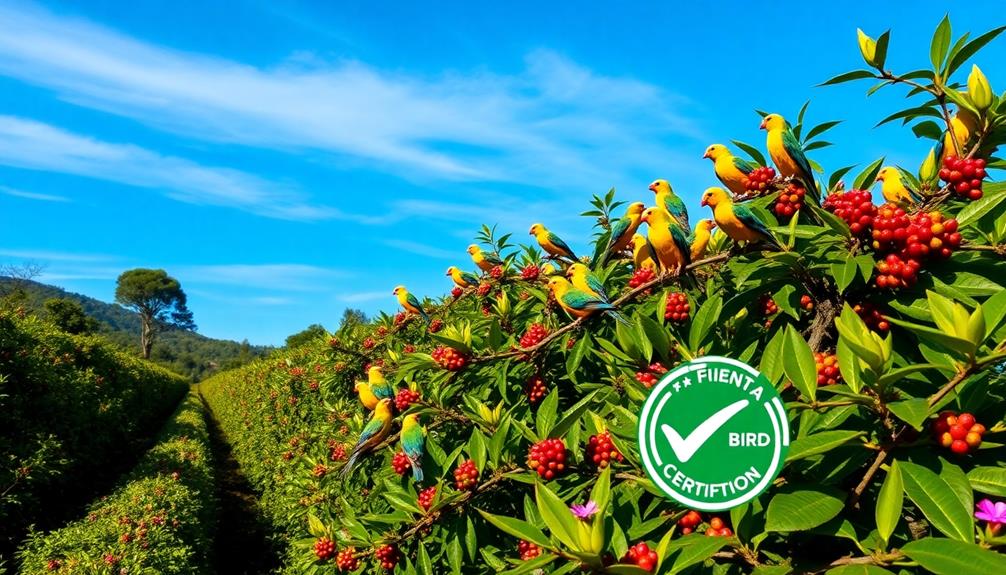
While you might enjoy a good cup of coffee, understanding the significance of Bird-Friendly certifications can deepen your appreciation for this beloved beverage.
The Bird Friendly® certification, especially from the Smithsonian Migratory Bird Center, guarantees that coffee is grown in ways that protect critical habitats for migratory birds and other wildlife. By promoting shade-grown farming practices, these certifications support biodiversity and help mitigate climate change through enhanced carbon sequestration.
When farms achieve Bird Friendly® certification, they must follow strict environmental standards. This includes maintaining robust shade coverage and diverse plant life, which are essential for the survival of various bird species.
Additionally, certified coffee farms often receive a premium price for their products, creating economic incentives for farmers to adopt sustainable practices that benefit both the environment and their livelihoods.
The certification process is ongoing, with compliance checks and support from conservation organizations. This guarantees that certified coffees continue to meet high ecological standards.
Benefits for Biodiversity

When you choose Bird Friendly certified coffee, you're supporting the preservation of essential habitats for birds and other wildlife.
These certifications promote sustainable farming practices that not only enhance biodiversity but also help combat climate change.
Habitat Preservation Importance
Habitat preservation is essential for maintaining biodiversity, especially in regions where migratory birds and other wildlife rely on healthy ecosystems.
By choosing Bird Friendly certified coffee, you're actively supporting efforts that protect critical habitats for these species. The Bird Friendly certification, developed by the Smithsonian Migratory Bird Center, promotes the preservation of tropical agroforests, which provide shelter and food for migratory birds and countless other wildlife.
When you buy Bird Friendly coffee, you're not just enjoying a great brew; you're contributing to habitat conservation. These certified farms use sustainable farming practices that maintain ecological balance, benefiting a wide array of plant and animal life.
Unlike conventional farming, Bird Friendly methods grow coffee in shaded environments, preventing deforestation and its harmful effects on biodiversity.
Moreover, these practices promote carbon sequestration, which helps mitigate climate change while preserving essential habitats.
By supporting Bird Friendly coffee, you're helping to safeguard diverse ecosystems and protect various bird species from habitat loss.
Supporting Sustainable Farming
Choosing Bird Friendly certified coffee means you're also championing sustainable farming practices that greatly benefit biodiversity. When you opt for this coffee, you're supporting methods that preserve habitats vital for various bird species and enhance ecosystem diversity.
Bird Friendly certification guarantees that coffee is grown in shade, maintaining forest-like environments essential for migratory birds and other wildlife. These sustainable farming practices not only protect birds but also contribute to healthier soil and water systems.
By using organic methods, certified farms foster balanced ecosystems that support a wide range of species. When you choose Bird Friendly coffee, you're directly backing farmers committed to environmental stewardship, which leads to long-term ecological benefits.
Moreover, these practices enhance the overall health of the land, allowing for increased carbon sequestration through preserved vegetation. This contributes to the overall resilience of the ecosystem, making it better equipped to handle environmental changes.
By selecting Bird Friendly certified coffee, you help create a sustainable future where biodiversity thrives, guaranteeing that the rich tapestry of wildlife, including our feathered friends, continues to flourish.
Your choice matters—support sustainable farming today!
Climate Change Mitigation
By selecting Bird Friendly® certified coffee, you're not just making a choice for your morning brew; you're actively participating in climate change mitigation efforts that benefit biodiversity. These certifications guarantee that coffee is grown in tropical agroforests, which play an essential role in sequestering carbon. By preserving these environments, Bird Friendly farms help reduce greenhouse gas emissions and combat climate change.
Additionally, AI-driven personalization in E-learning can be applied to educate consumers about the environmental impact of their coffee choices, enhancing awareness and encouraging more sustainable decisions.
The sustainable farming practices encouraged by Bird Friendly certification maintain biodiversity, supporting a variety of bird species and other wildlife that are significant for ecosystem health. Responsible land use on these farms enhances habitat resilience, allowing ecosystems to adapt more effectively to changing climate conditions.
When you choose Bird Friendly® certified coffee, you're supporting a market for environmentally conscious products, which incentivizes farmers to adopt methods that further contribute to climate change mitigation and biodiversity conservation.
Ultimately, your coffee choice not only fuels your day but also supports a healthier planet, rich in biodiversity. By investing in Bird Friendly coffee, you're making a considerable impact in preserving the natural environments that sustain both wildlife and our climate.
Understanding the Certification Process
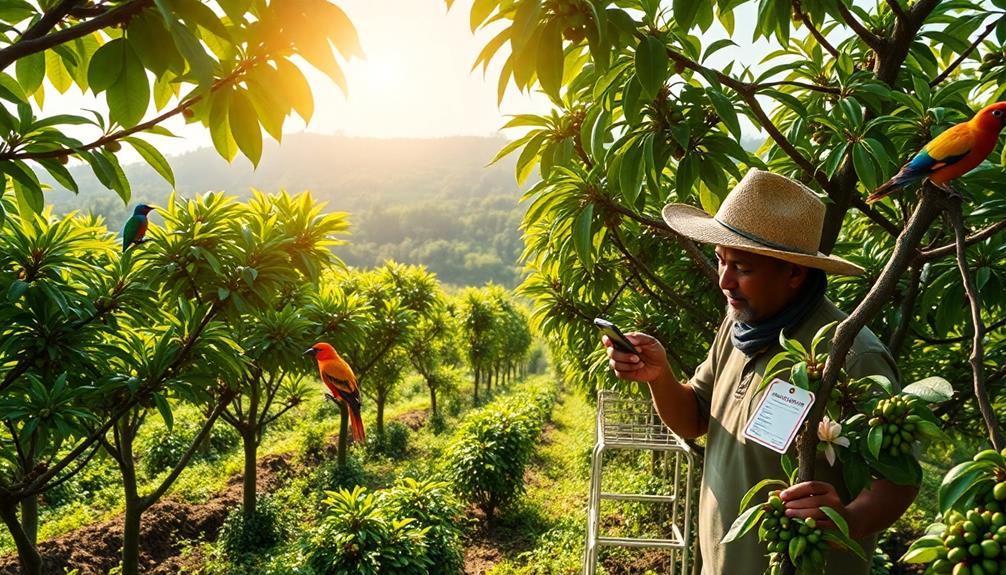
Steering through the Bird Friendly certification process can seem intimidating, but it offers a clear path for farmers committed to sustainable coffee cultivation. To start, you'll need to fill out an application form that highlights your dedication to sustainable practices and habitat preservation. Certification is conducted by the Quality Certification Services (QCS), which guarantees compliance with both Bird Friendly and USDA Organic standards.
Here's a quick overview of the process:
| Step | Description |
|---|---|
| Application | Submit a form detailing sustainable practices. |
| Compliance Check | QCS reviews adherence to Bird Friendly standards. |
| Site Assessment | On-site evaluation of shade and habitat conditions. |
| Ongoing Support | QCS provides guidance to maintain certification. |
Each certified farm must adhere to strict shade and habitat requirements to promote biodiversity and support migratory bird populations. Throughout your certification journey, QCS offers ongoing support, guaranteeing you stay compliant and even improve your farming practices. By achieving Bird Friendly certification, you can access premium markets and meet the growing consumer demand for eco-friendly products.
Economic Impact on Farmers
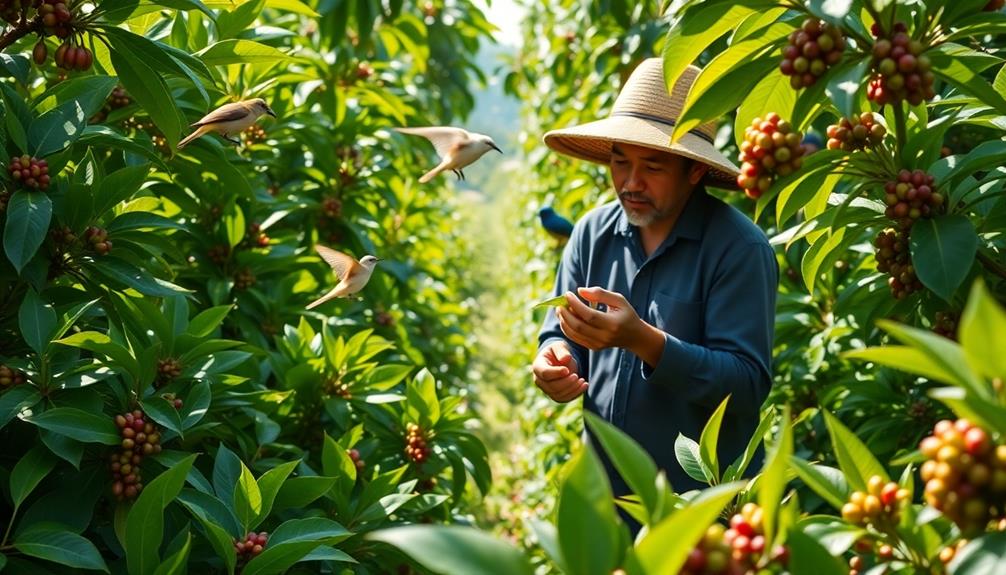
When you produce Bird Friendly certified coffee, you can tap into premium pricing that boosts your income.
Accessing niche markets focused on sustainability opens up new opportunities for your business.
Premium Pricing Benefits
Farmers who produce Bird Friendly certified coffee often experience significant economic advantages thanks to premium pricing. This premium allows you to earn more for your coffee, enhancing your income stability compared to non-certified alternatives. As consumers increasingly seek eco-friendly products, tapping into this growing demand can lead to higher sales that boost your bottom line.
Moreover, the Bird Friendly certification encourages you to implement sustainable farming practices that improve soil health and crop resilience. Over time, these practices can lower your production costs, providing long-term financial benefits. By maintaining environmentally responsible farming methods, you not only secure better prices but also contribute to the preservation of biodiversity, which is essential for future agricultural success.
Collaboration with conservation organizations through Bird Friendly certification can also offer additional funding and resources. These partnerships further support your economic viability by providing tools and knowledge to enhance your farming operations.
Ultimately, the premium pricing associated with Bird Friendly coffee incentivizes you to prioritize both your economic success and the health of the environment, ensuring a win-win situation for you and the planet.
Niche Market Access
Access to niche markets can greatly impact a farmer's economic stability and growth. When you produce Bird Friendly certified coffee, you can command a premium price for your products.
This certification opens doors to markets that prioritize environmentally sustainable practices, making your coffee more appealing to consumers who care about the planet.
As demand for eco-friendly products rises, you can take advantage of the growing number of environmentally conscious consumers willing to pay more for Bird Friendly coffee. This increased demand not only boosts your income but also enhances your visibility in a crowded market.
Moreover, collaborating with conservation organizations often provides additional funding and support, further stabilizing your economic situation.
These partnerships can lead to resources that help you improve your farming practices and protect your land.
Long-term Financial Stability
The benefits of Bird Friendly certification extend beyond niche market access, contributing greatly to long-term financial stability for your farming operation. By growing Bird Friendly certified coffee, you can tap into premium pricing, enhancing your income stability compared to non-certified products. This premium can prominently impact your bottom line, allowing you to invest back into your farm.
Access to niche markets focused on sustainability can lead to increased consumer demand. As more customers seek environmentally friendly options, Bird Friendly practices position you to benefit from better financial returns. Additionally, collaborating with conservation organizations can provide funding and support opportunities that further bolster your financial security.
Adopting sustainable farming methods not only reduces costs associated with chemical inputs but also often increases your yields over time. This means you can enjoy a healthier profit margin while minimizing environmental impact.
The Bird Friendly certification process also aligns with organic standards, making your coffee more marketable to health-conscious consumers willing to pay a premium.
In short, Bird Friendly certification not only supports wildlife but also lays the groundwork for sustainable economic success in your farming venture.
Where to Find Certified Coffee
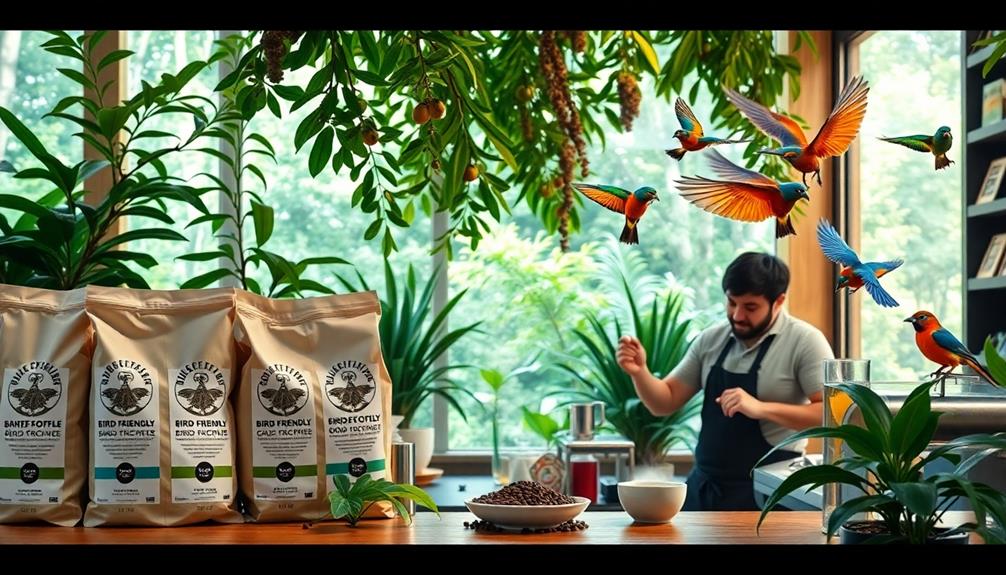
Finding Bird Friendly® certified coffee is easier than ever, thanks to a variety of local stores and cafés that cater to eco-conscious consumers. You can check out your nearby health food stores, specialty coffee shops, and even some larger grocery chains that stock these sustainable options.
If you prefer shopping online, you'll find numerous retailers offering Bird Friendly certified coffee, allowing you to conveniently order directly from certified farms. This not only supports sustainable practices but guarantees you're enjoying high-quality coffee.
To make your search even simpler, utilize interactive maps and lists available on various websites that highlight retailers selling Bird Friendly coffee in your area. Seasonal availability is commonly noted, so you can plan your purchases around the freshest selections.
Popular Bird-Friendly Coffee Products
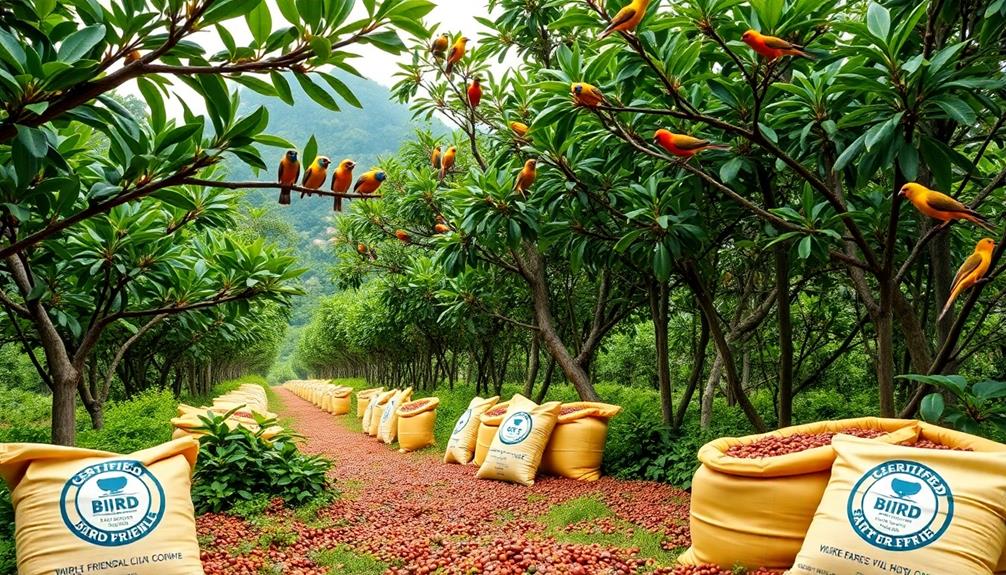
Bird-Friendly coffee products have gained popularity among eco-conscious consumers who value sustainability without sacrificing flavor.
If you're looking for a delicious option, consider the Migration Celebration Coffee priced at $14.79 or the Guatemalan French Roast Coffee at $14.89. Both are recognized for their sustainable farming practices, ensuring that your morning brew supports bird conservation.
Another favorite is the Peruvian Carbon Neutral Coffee, available for $14.49, boasting impressive eco-friendly credentials.
If you prefer unroasted options, check out the Organic Honduran Bird-Friendly Green Coffee for just $6.55—perfect for those wanting to craft their own blends.
What's great about bird-friendly coffee is that it often meets USDA Organic standards and adheres to rigorous shade and habitat guidelines, making it a responsible choice.
You'll also find a variety of blends, including the Organic Espresso #44 Blend, which customers rave about for its rich flavor. Low-acid options are available too, ensuring that you can enjoy a quality cup without discomfort.
Environmental Advantages of Certification
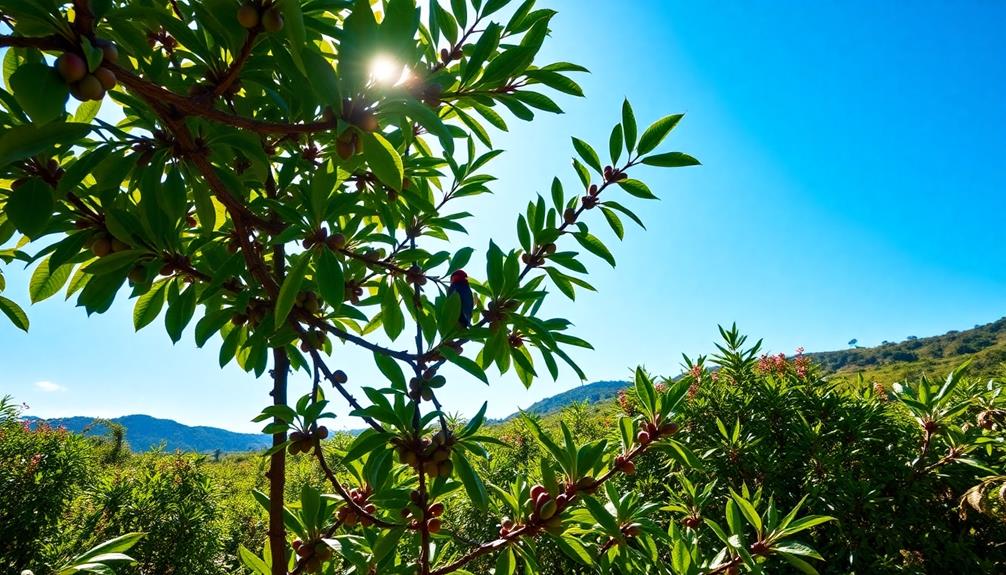
When you choose Bird Friendly certified coffee, you're supporting habitat preservation efforts that protect essential ecosystems for wildlife.
These farms promote biodiversity enhancement initiatives, creating environments where migratory birds and other species can thrive.
Habitat Preservation Efforts
Numerous studies highlight the significant role that Bird Friendly certification plays in habitat preservation. By promoting the conservation of tropical agroforests, this certification creates essential habitats for migratory birds and other wildlife, guaranteeing their survival during seasonal changes.
When you choose bird-friendly coffee, you're supporting sustainable farming practices that maintain natural habitats instead of clearing land for agriculture.
Bird Friendly farms provide important shelter and food sources for various bird species, helping to conserve their populations. You directly contribute to these efforts by purchasing coffee from certified farms.
Additionally, these farms engage in carbon sequestration, which mitigates climate change while maintaining ecological balance.
The rigorous standards of Bird Friendly certification mandate that coffee is grown in forest-like habitats, fostering a diverse array of plant life that supports numerous wildlife species.
When you sip on a cup of bird-friendly coffee, you're not just enjoying a delicious beverage; you're actively participating in preserving crucial habitats. In doing so, you help promote a thriving ecosystem for birds and other wildlife, making a positive impact on the environment with every purchase.
Biodiversity Enhancement Initiatives
Choosing bird-friendly coffee not only supports habitat preservation but also enhances biodiversity through its certification initiatives. When you opt for Bird Friendly coffee, you're backing sustainable farming practices that create and maintain habitats essential for migratory birds and various wildlife.
Certified farms prioritize forest-like environments, allowing a diverse range of flora and fauna to thrive, which contributes to overall ecosystem health. These farms actively encourage agroforestry systems, which protect bird species while also providing significant carbon sequestration benefits, helping to mitigate climate change.
By adhering to strict environmental and agricultural standards, Bird Friendly farms work to maintain ecological balance and promote diverse plant life. You're directly supporting conservation efforts when you choose this coffee, ensuring the survival of migratory songbirds during critical seasonal changes.
These initiatives provide safe and healthy habitats, allowing these birds to flourish. Ultimately, by selecting Bird Friendly coffee, you're not just enjoying a great cup of joe; you're playing an essential role in enhancing biodiversity and supporting the delicate balance of our ecosystems. Your choice makes a difference!
Bird Species Supported

Bird Friendly certified farms stand out as essential habitats for over 200 migratory bird species, including warblers, tanagers, and thrushes.
These farms, recognized by the Smithsonian Migratory Bird Center, focus on maintaining a diverse canopy structure that's critical for the life cycles of various bird species supported. This diverse environment provides important nesting sites and food sources, particularly during migration periods when birds need safe havens.
The habitat preservation practices on Bird Friendly farms contribute greatly to the overall health of ecosystems. Not only do they support a wide variety of bird species, but they also foster conditions for other wildlife to thrive.
Research indicates that farms with Bird Friendly certification boast considerably higher bird densities and species richness compared to conventional coffee farms.
This means that when you choose Bird Friendly coffee, you're not just enjoying a great brew; you're also playing a part in sustaining essential habitats for these beautiful migratory birds.
Engaging With the Movement

Engaging with the Bird Friendly movement is more than just a choice; it's a way to actively support sustainable farming practices that protect essential habitats for migratory birds and other wildlife. By opting for bird-friendly coffee, you're making a direct contribution to environmental stewardship. These sustainable practices not only benefit birds but also enhance the overall health of ecosystems.
You can amplify your impact by participating in local initiatives and community efforts that promote bird conservation. These collaborative actions can encourage others to make environmentally conscious choices as well.
To deepen your understanding of bird conservation, utilize available resources and educational materials that highlight ecological issues. Purchasing Bird Friendly certified products directly supports farmers committed to sustainable agriculture, ensuring they can continue their significant work.
Staying connected to the movement is imperative, so subscribe to newsletters and updates from organizations involved in the Bird Friendly initiative. This way, you'll remain informed about ongoing projects in coffee-producing regions and learn how you can further engage in this meaningful cause.
Your choices matter, and by getting involved, you're helping to create a more sustainable future for both birds and farming communities.
Consumer Choices and Impact

Supporting sustainable coffee options fosters a positive impact on the environment and wildlife. When you choose Bird Friendly® certified coffee, you're not just enjoying a great cup of joe; you're also supporting sustainable farming practices that help preserve essential habitats for migratory birds and other wildlife. This choice contributes to biodiversity conservation, which is critical for our planet.
Bird Friendly coffee is USDA Organic certified, meaning you're purchasing products grown without harmful chemicals, benefiting both your health and the environment. By opting for Bird Friendly coffee, you directly support farmers committed to environmental stewardship, who often receive a premium for their sustainably grown products.
The certification process itself is rigorous, ensuring that shade-grown coffee protects diverse plant life and promotes ecological balance. This makes your choice not only responsible but impactful.
Engaging with the Bird Friendly movement enhances your awareness of ecological issues and encourages the growth of niche markets prioritizing sustainable agricultural practices. Your consumer choices matter, and by choosing Bird Friendly, you play an essential role in fostering a healthier planet and supporting the delicate ecosystems that thrive within it.
Frequently Asked Questions
What Is Certified Bird Friendly Coffee?
Certified Bird Friendly coffee's grown in shaded areas that mimic natural habitats, supporting bird populations. It's produced sustainably, without harmful chemicals, benefiting both wildlife and farmers, while offering you a premium product for your conscious choices.
How Do I Know if My Coffee Is Bird Friendly?
When you know better, you choose better. To find bird-friendly coffee, look for specific certifications on the packaging, like Smithsonian Bird Friendly® or USDA Organic, ensuring it's grown sustainably and supports wildlife habitats.
Is Starbucks Bird Friendly Coffee?
Starbucks doesn't offer Bird Friendly coffee, so if you're looking for eco-conscious options, you should explore other brands. Check for certifications that guarantee sustainable practices and protect bird habitats for a better choice.
Is Dunkin Donuts Coffee Bird Friendly?
You know what they say: "You reap what you sow." Dunkin' Donuts coffee isn't bird-friendly, as it lacks certification for sustainable practices. If you care about the environment, consider seeking out brands that prioritize eco-friendly sourcing.
Conclusion
By choosing bird-friendly coffee, you're not just sipping your morning brew; you're nurturing a vibrant ecosystem, like planting seeds of hope for our feathered friends. Every cup you enjoy supports biodiversity and uplifts farmers, making a tangible difference in the world. So, next time you indulge in that rich, aromatic coffee, remember you're part of a movement that protects our planet's precious wildlife. Your choice can be the spark that ignites positive change!
In the vast and diverse world of coffee, coffee alternatives, and tea, Olivia has found her calling. As an author and a dedicated coffee and tea aficionado, her work for Cappuccino Oracle reflects her profound love and understanding of the intricate complexities found within these beverages. Olivia’s passion for the subject serves as both a catalyst for her creativity and a connection point with her audience.
Olivia’s appreciation for coffee, coffee alternatives, and tea blossomed at an early age. She discovered that these beverages invigorated her senses and stimulated her creative spirit. From the nuanced flavors of single-origin roasts to the captivating narratives intertwined with coffee, coffee alternatives, and tea trade and culture, Olivia found an unlimited source of inspiration in her daily cup.
Her love for these beverages and her talent for storytelling eventually converged at Cappuccino Oracle. As an author, Olivia’s mission is to illuminate the intricate tapestry that makes up the world of coffee, coffee alternatives, and tea. Her articles span a diverse range of topics, encompassing everything from the unique flavors of different brews to the sociocultural history intertwined with their cultivation and consumption.
Sustainable and Ethical Tea Sourcing
Sustainable Coffee Packaging Guide
Optimize your coffee packaging with sustainable materials and practices; discover essential tips that could transform your brand’s environmental impact.
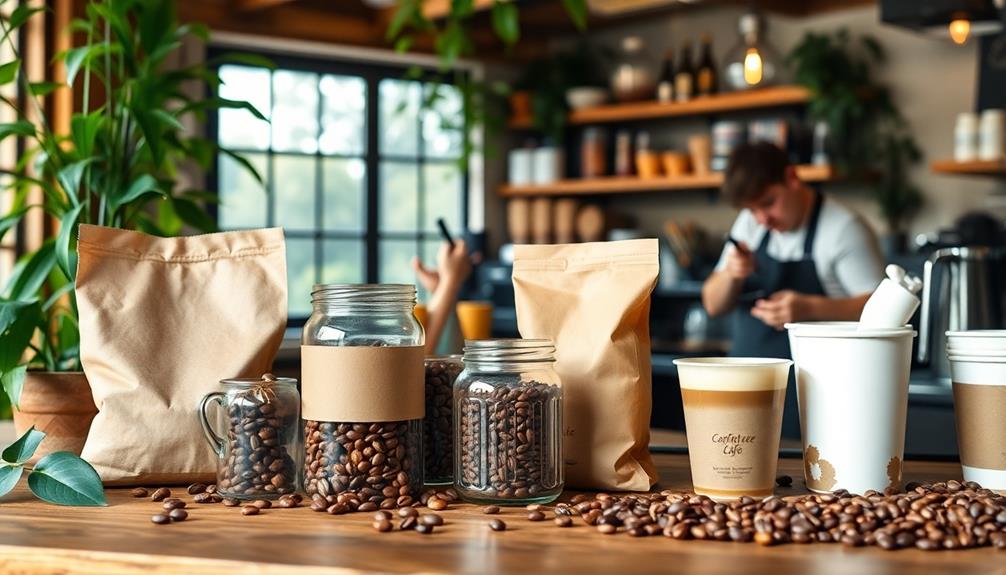
Sustainable coffee packaging is essential for reducing your environmental impact and catering to eco-conscious consumers. To start, choose materials like unbleached kraft paper or PLA, which are recyclable and biodegradable. You can also consider compostable options that break down in 90 days, promoting a circular economy. Look for innovative features, such as degassing valves, to preserve freshness without compromising sustainability. Staying informed about industry trends can help you make smarter choices for your brand. If you want to explore more strategies to enhance your coffee packaging, you've come to the right place for insights and tips!
Key Takeaways
- Choose materials like unbleached kraft paper, rice paper, and bioplastics for eco-friendly packaging options that are recyclable and biodegradable.
- Understand the difference between compostable and recyclable packaging to maximize environmental benefits and reduce landfill waste.
- Implement freshness preservation techniques such as degassing valves and moisture barriers to ensure quality while using sustainable materials.
- Stay informed about local recycling and composting facilities to enhance sustainability efforts and make informed packaging choices.
- Monitor industry trends for innovations in sustainable materials that enhance functionality and minimize reliance on virgin plastics.
Importance of Sustainable Packaging

Sustainable packaging plays an important role in the coffee industry, helping to reduce the carbon footprint associated with production and distribution. By shifting towards sustainable packaging, you can greatly decrease the overall emissions, which account for about 3% of the coffee supply chain's total footprint.
This change is largely driven by consumer demand, as many coffee lovers are willing to pay a premium for eco-friendly options that reflect their values and enhance brand loyalty.
Effective sustainable packaging isn't just about being biodegradable; it should also be recyclable and reusable, minimizing its environmental impact throughout its lifecycle.
When you choose packaging solutions that promote a circular economy, you're contributing to resource conservation and reducing landfill waste.
Moreover, educating consumers on proper disposal methods for sustainable coffee packaging is essential. By doing so, you maximize the environmental benefits and support broader sustainability efforts.
When you embrace sustainable packaging, you're not only responding to consumer demand but also playing a major part in creating a healthier planet.
Ultimately, sustainable packaging is an important step toward a more responsible and eco-conscious coffee industry.
Types of Sustainable Materials
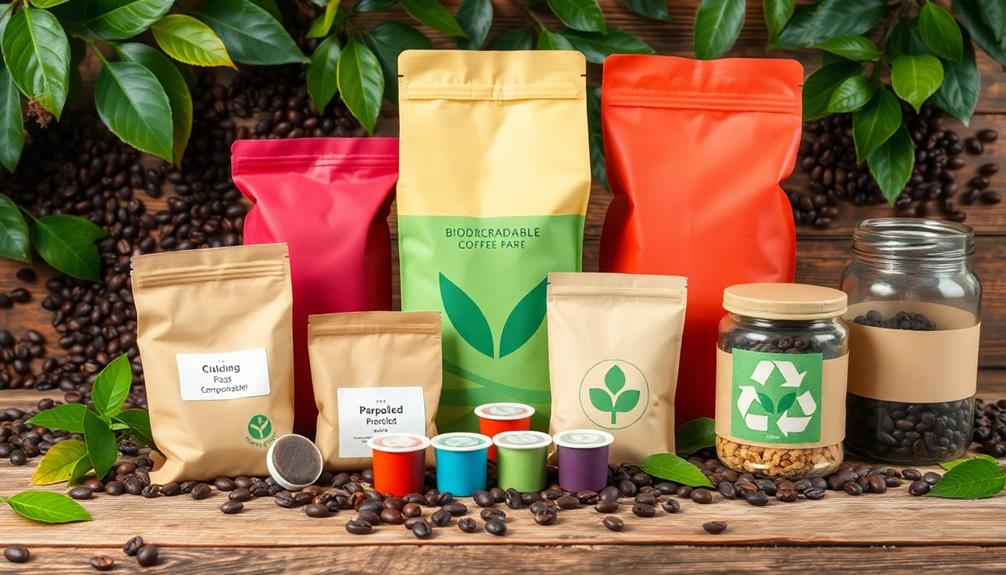
When considering eco-friendly options for coffee packaging, you'll find a variety of sustainable materials that can meet your needs. Unbleached kraft paper is an excellent choice, as it's 100% recyclable, biodegradable, and compostable, sourced from FSC-certified forests to minimize environmental impact.
If you're looking for something unique, rice paper bags made from renewable materials like quintan tree bark and bamboo offer a low-maintenance option with a minimal environmental footprint.
LDPE coffee bags stand out for their 100% recyclability, lightweight nature, and flexibility, requiring considerably less energy during production than traditional plastics.
Another innovative material is PLA (Polylactic Acid) packaging, which is biodegradable and derived from renewable sources such as corn and sugar cane. PLA decomposes in controlled composting environments within as little as 90 days, making it a great option for eco-conscious businesses.
As ongoing innovations in sustainable materials continue to improve packaging functionality, you can confidently choose options that reduce reliance on virgin plastics while effectively meeting your specific needs.
Embracing these sustainable materials not only supports the environment but also enhances your brand's commitment to sustainability.
Compostable vs. Recyclable Options

Choosing between compostable and recyclable coffee packaging can greatly impact your environmental footprint. Compostable packaging options, like home compostable pouches, decompose in backyard systems within about 90 days, making them ideal for products with high contamination risk.
On the other hand, recyclable coffee bags need proper recycling facilities to be effectively repurposed, which ties into local waste management systems and their capabilities.
Both options considerably outperform virgin plastics, contributing positively to the circular economy when disposed of correctly. The Material Circularity Indicator (MCI) score helps assess the circularity of packaging, showing that while compostable materials often score better in biodegradability, they can face challenges in industrial composting systems.
It's essential to be aware of local recycling and composting rates, as flexible pouches often have low participation. Proactive collection schemes can enhance sustainability outcomes and guarantee compliance with packaging standards.
Ultimately, choosing the right type of sustainable coffee packaging depends on your specific needs and the infrastructure available in your area, impacting both your environmental impact and the effectiveness of waste management efforts.
Freshness Preservation Techniques

Freshness is critical when it comes to coffee, and the right preservation techniques can make all the difference in maintaining its rich flavor and aroma. One effective method is using degassing valves, which allow carbon dioxide to escape while blocking oxygen, ensuring freshness preservation. Properly sealed packaging not only enhances flavor but also reduces food waste.
To further extend shelf life, select materials that offer moisture protection and an oxygen barrier. Multi-layer kraft paper and rice paper bags are excellent choices, as they shield coffee from air and light. Here's a table summarizing key freshness preservation methods:
| Technique | Benefits | Materials Used |
|---|---|---|
| Degassing Valves | Prevents oxygen entry | Plastic, biodegradable options |
| Moisture Protection | Shields against humidity | Multi-layer kraft paper, rice paper |
| Oxygen Barrier | Preserves flavor and aroma | Foil, compostable packaging |
| Smart Technologies | Monitors freshness | Sensors, app integration |
| Biodegradable Materials | Supports environmental sustainability | Plant-based films, recycled paper |
Industry Trends and Innovations
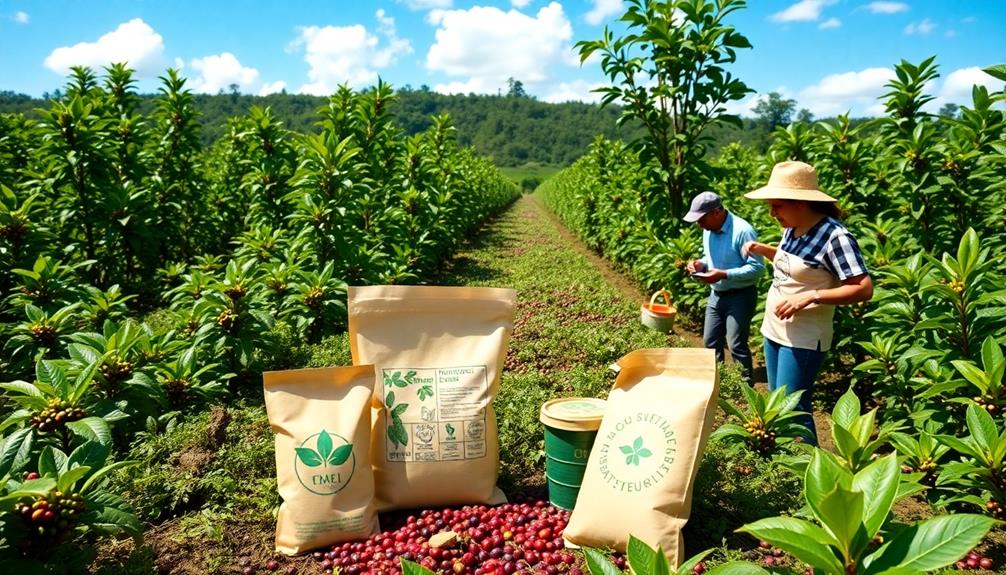
In the evolving world of coffee packaging, sustainability is taking center stage as companies embrace innovative materials and practices. You'll notice a shift towards sustainable materials like unbleached kraft paper and bioplastics, which markedly reduce environmental impact.
Continuous research is driving innovations that aim to replace virgin plastics and improve recyclability, making your packaging choices more eco-friendly.
The Material Circularity Indicator (MCI) score is gaining traction as an essential metric for businesses to assess their packaging sustainability from production to end-of-life.
Companies are prioritizing compostable coffee pouches designed to break down effectively in both home and industrial composting systems, ensuring that waste doesn't linger in landfills.
Emerging technologies are also leading to the development of high-barrier paper pouches that maintain coffee quality while being recyclable.
These advancements address previous challenges faced by traditional packaging, giving you more options that align with your values.
Frequently Asked Questions
How Can Consumers Identify Sustainable Coffee Packaging at Stores?
When you're shopping, look for labels indicating eco-friendly materials, certifications like compostable or recyclable symbols, and brands promoting sustainability. Asking staff about their packaging choices can also help you make informed decisions.
Are There Certifications for Sustainable Coffee Packaging Materials?
Yes, you'll find several certifications for sustainable coffee packaging materials. Look for labels like FSC, Cradle to Cradle, or Biodegradable. These certifications indicate environmentally friendly practices and help you make more sustainable choices while shopping.
What Is the Cost Difference Between Traditional and Sustainable Coffee Packaging?
Did you know that switching to sustainable packaging can reduce costs by up to 15% over time? While traditional packaging may seem cheaper initially, sustainable options often lead to long-term savings and enhanced brand loyalty.
How Can Businesses Encourage Customers to Recycle Coffee Packaging?
You can encourage customers to recycle coffee packaging by providing clear instructions, offering incentives like discounts for returns, and creating engaging campaigns that highlight the environmental benefits. Make recycling easy and rewarding for everyone involved.
What Role Do Customers Play in Promoting Sustainable Packaging Practices?
You play an essential role in promoting sustainable packaging practices. By choosing eco-friendly options, sharing your preferences, and supporting brands committed to sustainability, you drive demand for responsible packaging that benefits both the environment and your community.
Conclusion
In a world where sustainability is as essential as your morning cup of coffee, choosing eco-friendly packaging can make a real difference. By opting for compostable or recyclable materials, you're not just protecting the planet; you're also ensuring your coffee stays fresh and flavorful. Just like a perfectly brewed cup, your choice of packaging can create a ripple effect, inspiring others to follow suit. Let's brew a brighter future together, one sustainable package at a time!
In the vast and diverse world of coffee, coffee alternatives, and tea, Olivia has found her calling. As an author and a dedicated coffee and tea aficionado, her work for Cappuccino Oracle reflects her profound love and understanding of the intricate complexities found within these beverages. Olivia’s passion for the subject serves as both a catalyst for her creativity and a connection point with her audience.
Olivia’s appreciation for coffee, coffee alternatives, and tea blossomed at an early age. She discovered that these beverages invigorated her senses and stimulated her creative spirit. From the nuanced flavors of single-origin roasts to the captivating narratives intertwined with coffee, coffee alternatives, and tea trade and culture, Olivia found an unlimited source of inspiration in her daily cup.
Her love for these beverages and her talent for storytelling eventually converged at Cappuccino Oracle. As an author, Olivia’s mission is to illuminate the intricate tapestry that makes up the world of coffee, coffee alternatives, and tea. Her articles span a diverse range of topics, encompassing everything from the unique flavors of different brews to the sociocultural history intertwined with their cultivation and consumption.
-

 Coffee Alternatives And Tea4 weeks ago
Coffee Alternatives And Tea4 weeks agoThe Coffee Alternative That’s Helping People Live to 100
-

 Coffee Alternatives And Tea2 weeks ago
Coffee Alternatives And Tea2 weeks agoNutritionists Are Raving About This Coffee Alternative – Here’s Why
-

 Coffee Alternatives And Tea2 weeks ago
Coffee Alternatives And Tea2 weeks agoThe ‘Miracle Tea’ That’s Helping People Sleep Better Than Ever
-

 Coffee, Tea and Alternatives and Health plus Fitness2 weeks ago
Coffee, Tea and Alternatives and Health plus Fitness2 weeks agoThe Shocking Reason Health Experts Are Abandoning Green Tea
-

 Coffee Alternatives And Tea2 weeks ago
Coffee Alternatives And Tea2 weeks agoThe Tea That’s So Good, It’s Causing Shortages Worldwide
-

 Coffee Alternatives And Tea2 weeks ago
Coffee Alternatives And Tea2 weeks agoThis Coffee Substitute Promises to Double Your Productivity
-

 Coffee Alternatives And Tea2 weeks ago
Coffee Alternatives And Tea2 weeks agoThe ‘Super Brew’ That’s Making Energy Drinks Look Like Soda
-

 Coffee Alternatives And Tea2 weeks ago
Coffee Alternatives And Tea2 weeks agoCoffee Lovers Are Freaking Out Over This New Alternative



























